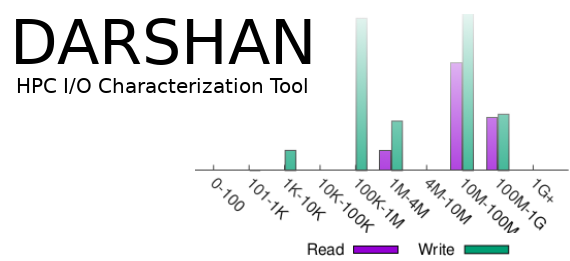A new Darshan pre-release (3.1.3-pre1) is now available for download here. Please be aware that this pre-release is experimental and not recommended for full-time use in production yet. We hope to have the official 3.1.3 release ready some time next week.
Here is the list of new features and bug fixes in this release:
- New DxT (Darshan eXtended Tracing) instrumentation modules that provide fine-grained tracing data of read/write operations at the POSIX & MPI-IO layers
- This tracing module is not enabled by default, and it is envisioned that it be enabled selectively at runtime for applications of interest
- This code was contributed by Cong Xu and Intel’s High Performance Data Division (HPDD)
- Darshan now captures command line arguments for Fortran applications
- This fix was contributed by Cristian Simarro
- Fix potential deadlock when using the Cray hugepages module and Darshan
- Reported by Glenn Lockwood & Cristian Simarro
- Fix potential segmentation fault when Darshan exceeds the maximum number of tracked access sizes/strides
- Reported by Glenn Lockwood
- Disable Darshan’s HDF5 module by default to avoid potential ABI compatibility issues with HDF5
- New configure switches are provided to enable Darshan support for specific HDF5 library versions
- Problem report and initial patch provided by Karl-Ulrich Bamberg
- Add whitelist to Darshan’s list of file path exclusions to prevent I/O to/from Cray’s Datawarp service from being filtered out
- Contributed by Glenn Lockwood
Updated documentation related to using the DxT tracing modules can be found in the source tree (‘darshan-runtime/docs’ for the Darshan runtime library & ‘darshan-util/docs’ for Darshan’s utilities). To summarize, DxT tracing can be enabled at runtime by exporting the ‘DXT_ENABLE_IO_TRACE’ environment variable. DxT also has a corresponding parser utility named ‘darshan-dxt-parser’ that can be used to parse trace data out of Darshan log files.
As always, let us know if you have any questions, issues, or concerns using the Darshan-users mailing list, or by opening an issue on the Darshan GitLab page.
